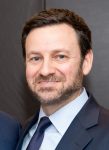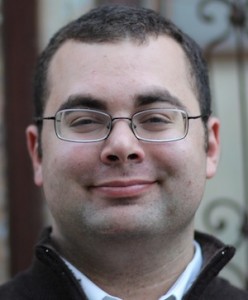Jay Ruderman (photo by Noam Galai)
The Ruderman Family Foundation is working to reshape societal attitudes about people with disabilities. Established in 2000 in Boston, the foundation attempts to foster inclusion by way of example, with a special focus on the Jewish community.
Jay Ruderman, a lawyer who spent nine years in Israel, has been at the helm of the foundation since 2008.
“Our first major initiative was including children with disabilities in the day school system in Boston,” Ruderman told the Independent. “We got into this issue of disability and inclusion out of a sense of fairness – principles within our family – that everyone deserves a fair shake.
“In terms of Jewish day schools, even within the same family, we began to ask why some kids were being included and enjoyed a Jewish education while others were not. Then, when I took over – my background is law and the civil rights aspect appealed to me – I began to see a broader picture and thought there was a vacuum in the Jewish community,” that advocacy was missing.
“You should know that people with disabilities are the largest minority in the world. And, not only that, they are also the poorest minority in the world and the most segregated [because of] stigmas and so forth.”
Initially, the foundation operated as a reactionary organization, wherein people would approach Ruderman’s parents for support. But, Jay Ruderman did not see this as a good way to make a positive impact.
He said that, traditionally, disability has been approached from the viewpoint of charity, and that a majority saw people with disabilities as unfortunate and in need of help. The “help” given usually led to segregation – separate schools, separate housing and separate work.
According to Ruderman, a transformation of perception was in order – the focus needed to be about each individual’s rights. He started his work to change views by doing a lot of outreach to the media, as well as awareness-raising and developing strategic working partnerships with major Jewish organizations.
“We are all connected to disability,” he said. “Everyone has a child, parent, sibling, neighbour with some sort of disability. For us, initially, we thought we didn’t really have a personal connection, but then, of course, like everyone else, I had a nephew born with autism – and my father developed a debilitating disability. It’s a widespread issue. But yet, I think the way we approached it was somewhat unique…. We’ve been doing this for a long time. It takes a long time to change attitudes.”
Within the Boston Jewish community, the foundation created an employment initiative called Transitions to Work, which has employed hundreds of people with disabilities and seen more than 100 employers hire people with disabilities. The foundation has also engaged in a community-wide synagogue inclusion project, which has spurred congregations from various denominations to be more inclusive and accepting of people with disabilities and their families.
In Israel, the foundation’s major effort has been a partnership with the government of Israel and the American Jewish Joint Distribution Committee to create a more inclusive society.
“That’s been a partnership with the Ministry of Finance, the Ministry of Health and the Ministry of Welfare, and we’ve engaged in that for many years,” said Ruderman. “Then, we began getting more involved nationally in the U.S. and looked for influential partners in the Jewish community. We developed partnerships across different streams of Judaism, the Foundation for Jewish Camp and Jewish Federations of North America.
“Internationally, we’ve had a prize called the Ruderman Prize in Inclusion, which has been awarded to communities and organizations excelling in inclusion, anywhere from Argentina to Uruguay, Mexico, all across the U.S. and Canada, England, Israel, South Africa, Australia and many different places around the world.”
Over the last few years, the foundation has developed an advocacy branch that has so far put out six white papers, garnering attention from the general media, including the New York Times, Washington Post and LA Times.
“The first paper we did was on police brutality and the fact that half the people in the country killed by the police have some form of a disability,” said Ruderman. “That’s gotten a lot of attention because, unfortunately, since the papers have come out, there’s been more people killed by the police and we’ve commented on those cases.
“We did a white paper on Hollywood and TV, as we found out that 95% of the characters with disabilities that you see on TV are played by able-bodied actors, and that really tapped into a diversity conversation in Hollywood that’s mainly focused on race. We injected disability into that conversation.”
The foundation also created the Ruderman TV Challenge, where they challenge creators to include more people with disabilities in new TV shows.
Elections are another area the foundation has examined – studying voting accessibility – as was self-driving cars and the transformative impact they could have on people with disabilities.
“People with disabilities should be thought of as these technologies develop,” said Ruderman.
The foundation also issued a paper about the murder of people with disabilities. “On average,” said Ruderman, “once a week, someone with a disability is killed by a caretaker – whether a family member or a professional.”
The foundation’s latest endeavour is called Rapid Response, where they try to respond to events more quickly, as they did when Donald Trump was running for president and mocked a reporter with a disability.
“We’ve done this too with Israeli officials and celebrities – mainly to shine a light on derogatory ways of acting or speaking about disability. So, we tend to speak out, and have developed a very active social media presence. We are now a combo of funding innovation in inclusion and doing a great deal of advocacy.”
Ruderman has found most Jewish institutions and synagogues to be very open to looking at ways of increasing inclusion, but also has heard many stories of people with disabilities and their families having been turned away by inaccessible or unwelcoming synagogues.
“I think rabbis know this is an issue,” said Ruderman. “What most don’t understand is that most solutions for accommodation are already available and, while the Ruderman Family Foundation doesn’t engage in capital financing, most communities have other foundations that do.
“I’ve always believed, we live in North America, in the wealthiest Jewish communities in the world, [and] the challenge with disability inclusion is that of willingness and awareness. To welcome a child with autism and their family, it takes some willingness to have a service that maybe is not as quiet as some congregants might like or be open to. Physical access for people using a wheelchair may be needed or, if someone is blind, they may need a Braille siddur. There are all sorts of different disabilities, but I find that when rabbis and community leaders are open, solutions can be found.
“Older generations tend to look at people with disabilities, even those in their own family, as separate and undeserving of being part of the community, but I think younger generations accept more diversity.
“My impression of Canada – I have spent some time, mainly in Eastern Canada – is that Canadians are very open-minded and progressive and there’s opportunity to find some real leadership that can reverberate across the world.”
For more information, visit rudermanfoundation.org.
Rebeca Kuropatwa is a Winnipeg freelance writer.


